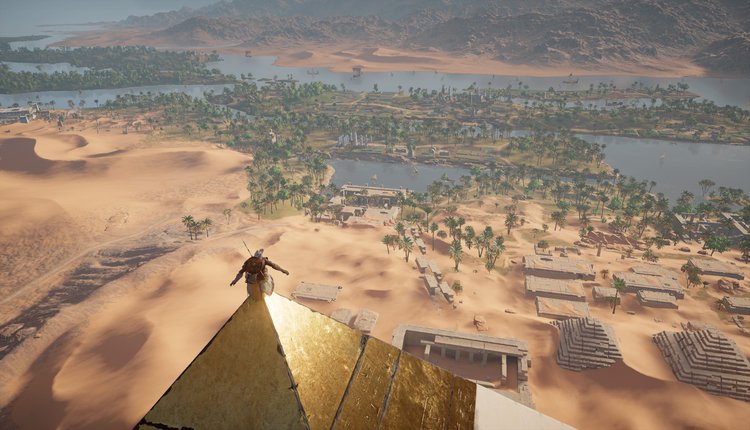Anarchy in the Ancient World: The Politics of Assassin’s Creed
The new Far Cry 5 will set you to killing a far-right militia in the American heartland. Wolfenstein II: The New Colossus let players kick Hitler in the face, literally. It’s 2018 and games are tackling politics in a big way. But confusion remains about where some games stand politically. Personally, I’ve never really understood what the Assassin’s Creed games were trying to say.
The most recent game in the expansive series, Assassin’s Creed Origins, puts you in the sandals of Bayek. A former Medjay (think Egyptian super detective) Bayek is out for revenge against an order of masked men responsible for the death of his son. Along the way he meets Queen Cleopatra, King Ptolemy and Julius Caesar because Assassin’s Creed is nothing without its historical celebrities. Bayek serves all three to some degree and eventually becomes a rebel in his own right meaning his motives are not all about revenge.
Politically the Assassin’s Creed games have always leaned to the far-left though they often veer closer to anarchism than hard socialism or full-on communism. Throughout the series whether it was Altair, Ezio or Edward every character has sought to destroy the systems that they see as holding the people back from true liberty. The Brotherhood of Assassins or Hidden Ones as Bayek names them seek out and assassinate those they see as tyrants. They’re mostly right to do so but what do you do after you’ve knifed some despot in the neck?
According to Assassin’s Creed all that’s left to do after destabilising the local government is move on to the next depraved ruler that needs a hidden blade in the neck. Anyone with a passing interest in history can tell you that that never works out well. It didn’t work when the British colonised Ireland nor when the Japanese invaded China nor even when the United States intervened in countless war zones. Whether it’s an invading force or one man with a hood and a wrist blade no one ever seems to think about what happens next?
As fun as it is to steer pirate ships, scale pyramids and run across rooftops a quick glance down at the political mire Assassin’s Creed places itself in is enough to give anyone pause for thought. Traditionally democracy has proven itself as the best tool of the people not murder. Democracy, when used right, is often geared to solving problems while assassination causes a great deal of problems regardless of how it’s used. Assassination from the Roman Empire to Genghis Khan to the Austro-Hungarian Empire has splintered massive swathes of land into warring nations time and again. You would think humanity would learn but impatience often wins out.
[perfectpullquote align=”full” bordertop=”false” cite=”” link=”” color=”#70006C” class=”” size=”19"]”Ever since Ezio first beat up the Pope in Assassin’s Creed 2 the presence of an ancient race of extinct Gods has plagued the series”[/[/perfectpullquote]p>
To say I disagree with the methods of the Brotherhood of Assassins would be wrong but I do think they need improvement. Destroying the tools and crippling the systems of a corrupt state all have their merits but it’s what happens next that truly matters. Judging by what I’ve seen from the in-game seas of the Caribbean to the slums of Victorian London it’s that the Brotherhood of Assassins need to seriously think about their next step because it’s clear that their bureaus of recruited assassins aren’t doing their job properly. If they were then the evil machinations of the Templar Order would be a thing of the past long before the Templars even came into existence.
The battle between secret societies has been ongoing in fiction ever since the first novelists picked up their quills. It’s a trope that’s been endlessly complicated by Lovecraftian horrors, government conspiracies and ancient aliens. Assassin’s Creed is especially guilty of this. Ever since Ezio first beat up the Pope in Assassin’s Creed 2 the presence of an ancient race of extinct Gods has plagued the series. It’s almost the equivalent of the burning bush in the Book of Exodus only at least the bush delivered a command that was meaningfully carried out by a leftist prophet. In Assassin’s Creed the command to save the world is quickly brushed aside and only mentioned again through strange loading screens and glowing glyphs.

This is ultimately the crux of Assassin’s Creed. The series doesn’t make an awful lot of sense. In both its universe building and its politics it finds itself stuck. It’s a game that leaves a great deal of players scratching their heads regardless of whether they’re there for the parkour or the immense scale of it all. Assassin’s Creed always seems in danger of collapsing under its own weight.
When the shared universe of the games is built on such flimsy foundations as the original Assassin’s Creed implosion always seems possible. But Ubisoft have always managed to shore up the foundations. The extinct elder race and millennia old battle between the Assassins and the Templars become easy to ignore once both are pushed to the side in favour of the often engaging stories and exciting, tight gameplay. Diving off a tower into a hay bale is still great fun once you ignore the eons old deities and poorly considered politics.

